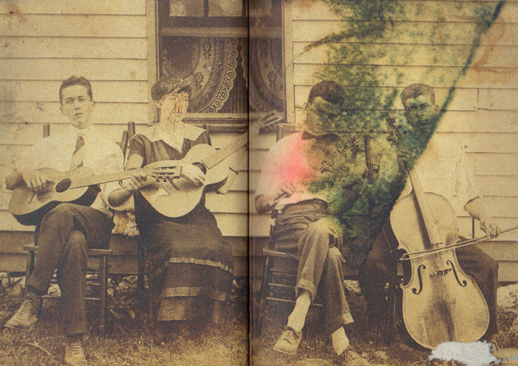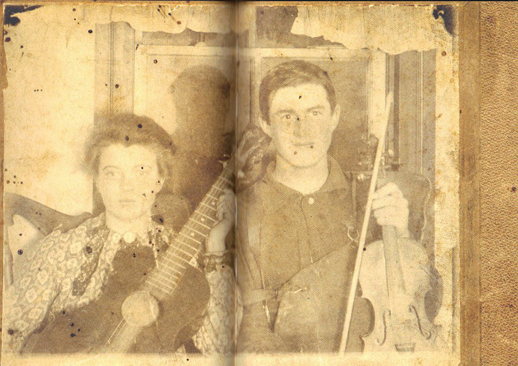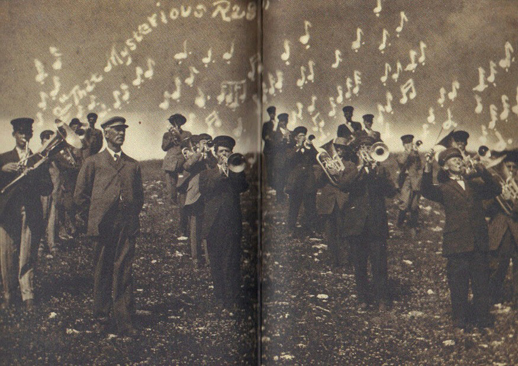
I Listen to the Wind That Obliterates My Traces – Music in Vernacular Photographs 1880-1955.
Reviewed by Ian Preece:
I can definitely remember the point, some time in my late twenties/early thirties, when looking back at old family photos suddenly became really sad. 1970s holidays; rainy days in Lincolnshire; caravans and bungalows on the east coast; a day-long game of beach cricket; the wind so strong your nana is sitting in a deckchair wearing a headscarf – even if sunshine is forecast for tomorrow . . . life is all ahead, as opposed to heading downhill . . . These days I even find myself welling up over other people’s old photographs, never more so than when I came across I Listen to the Wind That Obliterates My Traces – Music in Vernacular Photographs 1880-1955 , a terrific collection of mildewed and torn black & white and sepia photographs, bookended by two cds of crackly 78s. The shellac and the photos have both been picked up at yard sales over the years and put together by Steve Roden, a visual and sound artist from Los Angeles, and it’s all published by the ever-reliable Dust to Digital label.
It’s an undeniably melancholic package. The records tend to lonesome hill-billy blues and laments, mournful tales of loss and yearning, of roving gamblers, unfaithful good for nuthin drunks, lost wives and travelling salesmen. There’s the occasional redemptive moment, or peace and freedom finally achieved after a life of toil, beyond the shining river, ‘when they’ve rung the golden bells for you and me’ as sang Alfred G. Karnes in 1928. The same year Frank Ferrara’s Hawaiians were Pinin Hawaii for you (a track which has somehow cemented itself in my head) and three years later the equally mannered Roy Smeck Trio were Reaching for the Moon. When not pining for distant lands or lamenting the loss of a loved one, there was simple downhome bullying and small-town intimidation to deal with. My family are getting a little tired of hearing Gid Tanner and his Skillet Lickers’ (with Riley Puckett) tragic refrain: ‘Every time I come to town you boys go to kickin my dog aroun’ . . . but, well, without wishing to sound like Steve Buscemi in Ghost World, there’s seems something very contemporaneous about the mob picking on a poor guy’s dog. . .
In between the folk skits and tales of woe, Roden has interspersed some fantastic interludes from sound effects of albums of the 1930s: a flock of Canadian geese burst from the speakers; there’s a storm, and what sounds like rainfall but with ‘thunder not from life’, and some lovely clips of walking on snow and ice and ‘thin underbrush’, and wind blowing across a prarie in 1936 . . .Personally, I’m a sucker for muffled vinyl hiss and crackle, and there’s plenty here, as the cds seem to be direct transfers of the old 78s.

The records were probably in a similar state to the photographs. And the photographs are truly something else. Creased, blotchy, mildewed, underdeveloped or overexposed, you can almost smell the mustiness in some of them; some others are simply beautifully reproduced as clear as the day they were taken. Mostly posed for the camera and featuring folks with their instruments, poised for a hoedown, or simply seated on the porch or in the long grass (interspersed with the odd wrecked piano in a field) there’s an overwhelming sense of a simpler, purer way of being that knocks you sideways.

As Steve Roden writes in his introduction to I Listen to the Wind . . . who has not ‘at one time or another sat in the throes of loneliness, melancholy or suffering and held a communion of sorts with a record or two . . . as a group of favourite sounds enter us they move quickly to our souls and our insides are mended a little . . . even if it is only for an evening.’
Listen to Ian’s ‘Third light Home’ radio show HERE
I Listen to the Wind that Obliterates My Traces is published by Dust to Digital